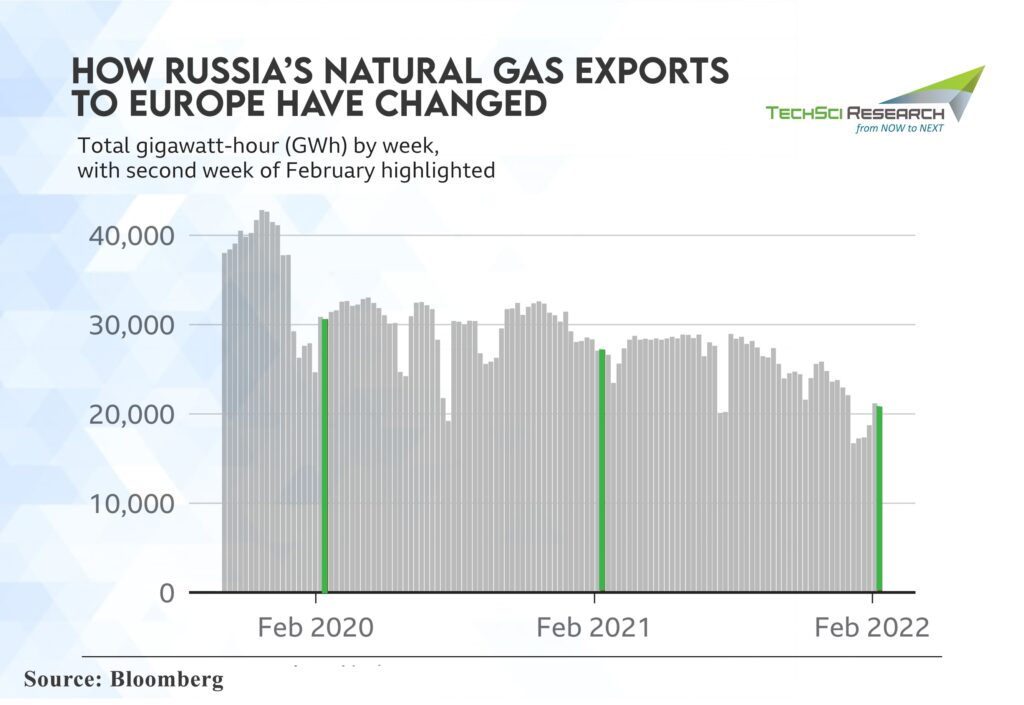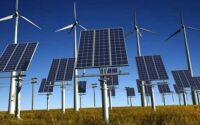How would Russia-Ukraine Crisis Impact Europe’s Energy Demand?
Around 100,000 Russian troops, backed by artillery, tanks, and air power, are entrenched on Ukraine’s border, expected to strike any moment. The possibility of a Russian invasion of Ukraine has spurred turmoil and created geopolitical tensions among world leaders. As the tension between the two countries is escalating, US and European allies are on high alert, presenting a unified front to avert a Russian invasion of Ukraine. However, Europe’s energy reliance on Russia has put the continent in crosshairs with the region’s largest energy supplier, Russia. European Union fulfills approx. 40% of its natural gas demand from Russia. The situation has become more fragile ever since Russia’s President Vladimir Putin has threatened to cut off westward energy supplies. The continent’s already beleaguered market could suffer a major blow if Russia discontinues energy supply for the long term.
Europe Natural Gas Crisis
The demand for natural gas is skyrocketing as the economic activities recover from the pandemic, but supplies are limited. According to an analysis by Goldman Sachs, the gas prices have already reached sky-high in recent months, and the prices will stay as high as normal until 2025. European countries are facing the highest prices for gas and electricity, resulting in economic damage, frequent blackouts, halt on production facilities, frozen homes, and an increase in prices of everyday purchases, including food. Many small energy providers in the UK collapsed due to volatile gas prices and the underperforming wind power sector. Hence, now Europe depends on gas imports, primarily from Russia and Norway to fulfill its energy requirements.
To alleviate the energy crisis in Europe, the world’s energy watchdog, International Energy Agency (IEA), intervened and called on Russia to export more gas. As per IEA, the gas-rich country has the potential to increase gas availability in Europe and ensure an adequate level of gas storage. Although Russia has been fulfilling its long-term contracts with its European counterparts, its natural gas exports to Europe have deteriorated from the 2019 levels. Some EU officials believe that Russia is deliberately holding the natural gas supplies as the gas-rich country is waiting for regulatory approval of the Nord Stream 2 pipeline. The Nord Stream 2 pipeline could help Russia double its export capacity of natural gas to Germany. However, Russia’s monopoly gas exporters, Kremlin, and Gazprom, are denying any wrongdoings and blame Europe for not securing energy supplies for the long term. In 2020, Russia decreased its supplies to Europe by 25% from 2020 in the fourth quarter of 2021 and 22% below pre-pandemic levels.

Europe has been taking proactive measures to meet the energy demands in case Russia plans to shut down its supplies. In February 2022, Europe imported three times the amount of liquified natural gas than it did in January, as per a report by Independent Commodity Intelligence Services (ICIS). Most of the supplies came from the United States and Qatar.
Is Europe’s Natural Gas Crisis Self-inflicted?
European Union has put in place a series of regulations and rules that make member states more dependent on Russian gas. The EU is still importing a strategically significant amount of gas from Russia. The construction of Nord Stream 2 will only increase the extent and duration of the continent’s reliance on Russian energy sources. Lack of coherent energy policy has stopped the EU from becoming a geopolitical superpower. EU member states often pursue conflicting policies towards nuclear, gas, or electricity generation, which has exacerbated supply shocks within the past decade. In addition, gas prices are rising because nuclear and coal use for energy production is rapidly declining due to the continent’s effort to transition towards clean energy. Europe’s short-sighted Russian policies have enabled Moscow to leverage its strategic energy sources over the continent.
Europe’s decarbonization efforts are too slow to beat the pace of changes in the global energy dynamics. Although liberalization of gas markets has saved the consumers almost USD70 billion in energy bills over the past decade, Europe’s dependence on Russia increased. With the growing energy demands in emerging economies, Europe needs to compete with Asia for gas to kick coal out of the global grid successfully. In the long term, decarbonizing the energy sector will be the best strategy for Europe to reduce its energy prices and enhance energy security. If EU member states had invested earlier into renewable energy sources and autonomous energy sources, they could have been better positioned to mitigate the fossil-related shocks.
What if Russia Cuts Off Natural Gas Supplies to Europe?
Reliance on Russia for natural gas import varies country-wise. While Germany is the largest importer, UK and Sweden hardly buy Russian gas. Western leaders in Europe and the United States have been pushing the countries to reduce their dependence on Russia to limit their vulnerability to geopolitical tensions. A sudden and complete cut-off of Russian gas to Europe is highly unlikely, but they can shut down supplies via Ukraine pipelines, affecting Central and East European countries. Although the EU can get additional volumes of gas from Norway, Qatar, Azerbaijan, and United States for the short term, Europe needs to find alternate solutions to meet the energy demands. Resorting coal seems like an attractive solution, but it could drastically affect Europe’s vision of achieving its carbon goals.
Like Europe depends on Russia for energy supplies, Putin depends on Europe for revenue. In 2021, Russia’s natural gas sales soared to more than USD60 billion. Gazprom, a state-owned energy company, accounts for most of Russia’s federal budget. Around half of Russia’s budget revenues comes from export revenues.
One of the major reasons for Russia not supplying enough natural gas is its enhanced focus on strengthening the domestic economy as the economy is slowly recovering from the pandemic effects. Besides, the high demand for energy during winters left Russian inventories to dry up, which made the country narrow down its supplies to Europe. Moreover, Russia needs to export gas to other countries like Turkey and China, so it does not have the spare capacity to cover spikes in demand.
European countries have been trying to implement a major transition to renewable energies for two decades, but they have not found much success yet. In 2020, less than 20% of EU’s energy requirements were fulfilled from renewable sources. Although the percentages of renewable energy are rising, they are insufficient and unreliable, thus cannot help to meet the energy demands of the bloc. Europe has been planning to diversify its natural gas sources in the Middle East and the United States.

Europe and US allies have promised economic and political sanctions if Russia plans to move into Ukraine with military force or the country cuts its natural gas delivery to Europe. The US administration and European Union have been working together with various gas-rich countries to prevent any energy disruptions.
Are Alternative Sources Answer to EU Energy Crisis?
Some European Union countries are actively seeking new nuclear power sources, including traditional light-water reactors and next-generation nuclear technologies. Adding more baseload capacity in the European Union will help moderate electricity prices by overcoming natural gas availability. In February 2022, France announced to expand its energy capacity by building six new nuclear reactors in the decades to come. Extending the lifespan of older nuclear plants and establishing new ones would help France drive carbon neutrality by 2050. Currently, France is the largest producer of nuclear power in the EU, generating 52% of the EU total nuclear energy production, followed by Germany accounting for 9% share.
Beyond nuclear power, other energy sources like biofuels can play a crucial role in fulfilling the energy demands. Advanced biofuels can prove to be essential for Europe’s energy transition to zero carbon to achieve its UN Sustainable Development Goals. The use of advanced biofuels in transport and industries can reduce emissions and reliance on imported fossil fuels and generate employment for the rural population. Besides, the EU is increasingly investing in expanding renewable energy sources like solar, wind, and hydropower to generate electricity in the continent. In 2020, renewable energy sources will become the most significant energy source of electricity, beating fossil fuels.
Conclusion
The Biden administration has threatened Russia to face severe economic consequences if it stops the gas supplies to Europe. The United States may ban the export of microchips and other electronics that are crucial for artificial intelligence and aerospace, freeze the personal assets of Russian President Vladimir Putin, and take other measures. Hence, it is unlikely that Russia would stop its natural gas supplies; however, the United States is preparing to mitigate any energy crisis in Europe.



